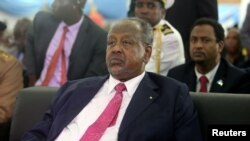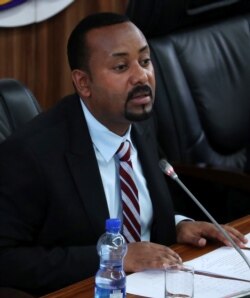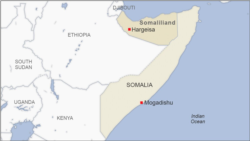The leaders of the federal government of Somalia and the self-declared republic of Somaliland held a landmark meeting in the neighboring Djibouti on Sunday.
The meeting was hosted and chaired by President Ismail Omar Guelleh of Djibouti.
“The resumption of the talks between Somalia and Somaliland is a perfect illustration of the continued determination of the leaders of the region to resolve differences through dialogue,” Guelleh said via Twitter.
The meeting agenda was not publicized, but one observer, who has been following the efforts that led to Sunday's talks, said the first step is to build trust between the sides and agree on a process for the talks.
By the end of the day, the two sides had agreed to appoint technical committees to continue the talks. The sides have also agreed not to politicize international development assistance and investment.
The United States Embassy, which has been supporting the process, welcomed the opening of the talks. “We support coop for the good of the #Somali people & urge all Somalis to be part of the process,” the embassy posted on Twitter.
@US2SOMALIA welcomes opening of #Somalia- #Somaliland talks today in #Djibouti. We commend the leadership of @M_Farmaajo & @Musebiihi. T/Y @IsmailOguelleh for hosting a historic mtg. We support coop for the good of the #Somali people & urge all Somalis to be part of the process.
— U.S. Embassy Mogadishu, Somalia (@US2SOMALIA) June 14, 2020
The United Nations office in Somalia followed up in endorsing the meeting in Djibouti.
“This is an encouraging step towards future #dialogue, which we hope will result in common benefits,” says the U.N.
The @UN in #Somalia welcomes talks between #Somali President @M_Farmaajo and #Somaliland President @musebiihi - hosted by #Djibouti's President @IsmailOguelleh, this is an encouraging step towards future #dialogue, which we hope will result in common benefits. pic.twitter.com/iLhn0zqJTZ
— UNSOM (@UNSomalia) June 14, 2020
A crucial participant of Sunday’s meeting was Ethiopia Prime Minister Abiy Ahmed, who is keen on bringing the two sides together, according to diplomats.
U.S. Ambassador to Somalia Donald Yamamoto, and representatives from the European Union, African Union and Inter-Government Authority on Development were present.
Guelleh acknowledged the meeting is a follow-up of the initiative by Ahmed, who brokered a meeting between Somalia President Mohamed Abdullahi Farmajo and Somaliland President Muse Bihi Abdi in Addis Ababa in February.
A proposed joint visit to Somaliland by Farmajo and Ahmed in February was shelved because of strong opposition from Somaliland opposition and parliamentarians.
Sunday's talks coincide with preparations by Somalia and Somaliland to celebrate their 60th anniversary of independence from Britain and Italy. British-colonized Somaliland gained independence June 26, 1960. The rest of Somalia achieved the same four days later, July 1, 1960, and on the same day the two independent regions (South and Northern) merged to form the first independent Somali republic.
Following a bloody war in the late 1980s, which human rights organizations said claimed the lives of tens of thousands in Northern regions, Somaliland declared secession in May 1991 but has not achieved international recognition.
In February, Farmajo acknowledged atrocities committed by the previous government of Somalia in the northern regions and apologized to the people of Somaliland.
Afyare Elmi, an assistant professor at Qatar University, says three opportunities brought about Sunday's meeting.
“The first and most important, Somaliland failed its quest to get recognition, and they are forced to find alternatives; and Somalia failed to form a government in Mogadishu that doesn’t include Somaliland,” he said.
“This is a mutually hurting stalemate. They both hit their heads on the wall, they are forced to seek the next best option.”
Elmi said the third opportunity is that powers that may have had different views on Somalia issues including Ethiopia, Djibouti, United States, the African Union and the European are now on the same position. “This opportunity didn’t exist before,” he said.
He also said the Somali government is prepared to make a political as well as economic concession to Somaliland.
The challenges, Elmi said, is that the president of Somalia is in the final year of his term and the Ethiopia prime minister is facing calls for elections that had been delayed by the coronavirus.
Elmi also says international community is not putting a lot of weight behind these talks.
“I don’t see a political capital investment in this initiative by the international community,” he said. “This issue is being handled by their embassies, I don’t think that is enough, they need to get in.”






